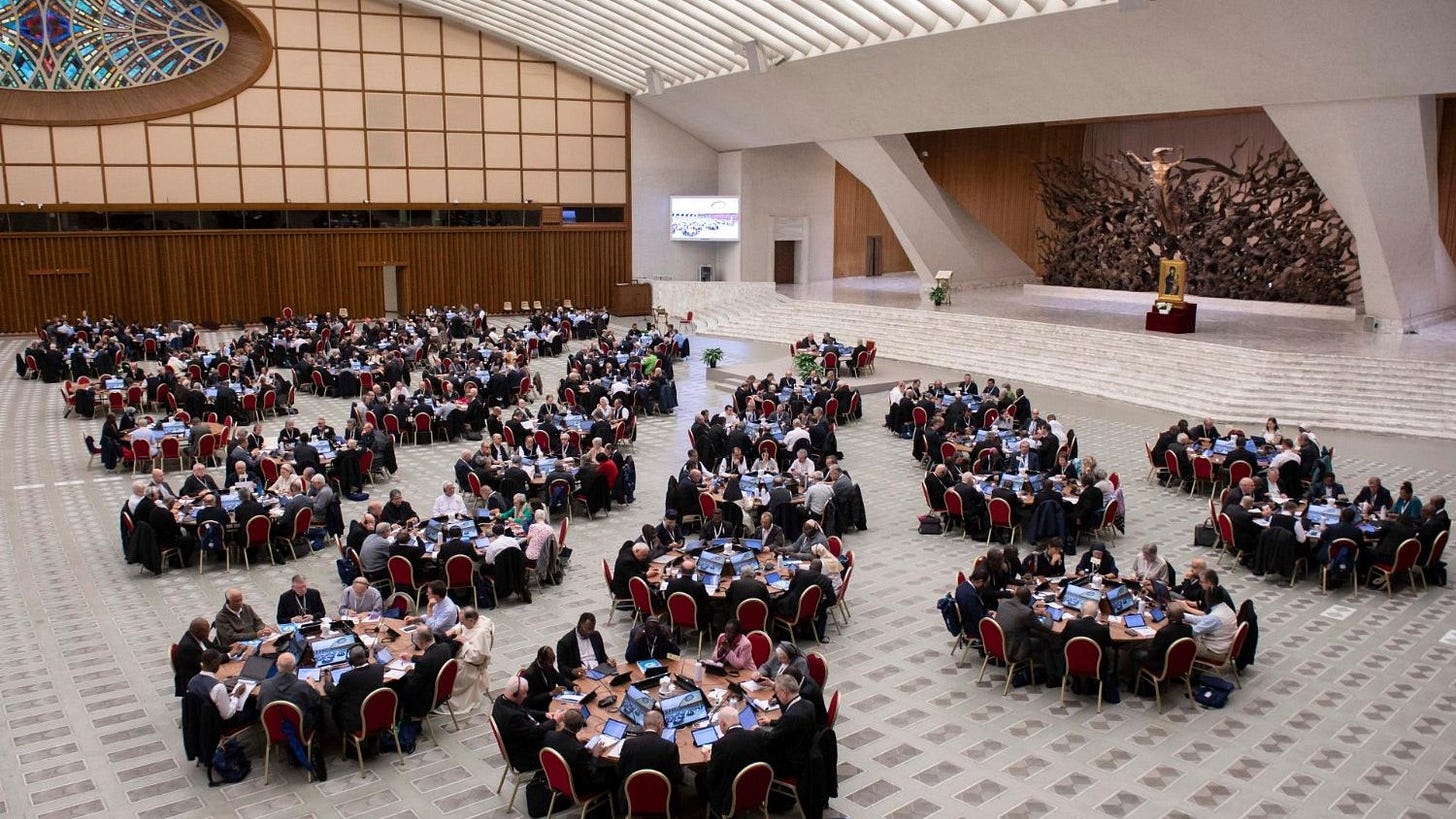SoS Sat Report: Africa is happy with the draft final document of the Synod
Africa is the power behind the Papal throne
The major news of the day was that the Vatican has extended its secretive provisional agreement with the Chinese Communist Party regarding the appointment of bishops in the People’s Republic of China, for a further 4 years. This is the third renewal of the Agreement that was first signed on September 22nd, 2018, and follows the two previous renewals for periods of two-years.
So yesterday I promised leaks from the draft final document, and they are in. The document doesn’t seem to reflect what was actually discussed at this session of Synod, lending credence to the suspicions that it had been written in advance of the Synod. It focuses primarily of bureaucratic instruments to implement compulsory listening in the Church at every level; parochial, diocesan, national, continental and global.
On the Synod floor people were unhappy that there is no mention whatsoever of the female diaconate in the document, despite it being brought up repeatedly over the last month. The were numerous interventions from Synod delegates to this end. There is also frustration from those that wanted substantive change in the way Church governance happens, they say the document is just talk and resolves nothing, but it uses plain wispy language that everyone can agree upon. Myriam Wiljens is probably not very happy.
The document is shaping up to be bland and uncontroversial, a direct effect of the new order in the Church that has happened as a result of Africa having found its voice after the publication of Fiducia supplicans. However, as I have said previously, the final document is irrelevant in the grand scheme of things. What really matters is the Post-Synodal Apostolic Exhortation that Pope Francis will publish next year.
Today’s press briefing was the penultimate before the presentation of the final document on Saturday. On the panel today were; Fridolin Cardinal Ambongo Besungu, O.F.M. Cap., Archbishop of Kinshaha, DRC, Archbishop Andrew Nkea Fuanya of Bamenda, Cameroon, Bishop Franz-Josef Overbeck of Essen, Germany, and Fr. Clarence Sandanaraj.
The Smell of Mendacity
At the press conference Cardinal Ambongo was asked about an article published on October 12th, in L’Osservatore Romano, the Holy See’s paper of record, by Fr. Timothy Radcliffe OP, the Synods Spiritual Director, where he argues that he reason for the pushback by the bishops of Africa to Fiducia supplicans, was because they “are under intense pressure from Evangelicals, with American money; from Russian Orthodox, with Russian money; and from Muslims, with money from the rich Gulf countries.”
This is an outrageous, despicable conspiracy with racial undertones, and not true. Cardinal Ambongo said that he had read the article, and that the notion that dark money is influencing African bishops is false, adding Fr. Radcliffe told him personally this morning that he never said any of those things.
“Fr. Radcliffe came to me before we began [the session] because he also read the article only yesterday, and he is shocked that such things may have been written attributing these things to him. Fr. Radcliffe has never said these things and this does not correspond at all to his personality.”
Here is the thing, as the Pillar has noted, the same text was published in the Tablet in April, with that article itself “adapted from a talk given at Stonyhurst College, Clitheroe, on Good Friday” by Fr. Radcliffe. I do not want accuse a future cardinal of lying like he is a US politician, and he is 79 years old, so there may be some cognitive decline, but I will say that people do not like being taken for fools. Though he is unlikely to vote in a future conclave, he was expected to have a major influence in potential pre-conclave meetings. However, this memory slip, to put it diplomatically, combined with the spreading a baseless conspiracy about African bishops is going to greatly reduce his influence in the choosing of the next Pope.
The Overbeck Window
The Bishop of Essen, Franz-Josef Overbeck, a major proponent of the Der Synodale Weg, emphasised that the Church needs to be re-inculturated in a post-secularization Germany. “After many years of being either Catholic or Protestant, now out of almost 84 million inhabitants half are without faith, without religion and even without an idea of who God is,” he said, “while the other half is almost equally divided between Catholics and Protestants, with a presence of over 4 million Muslims.”
He went on to say “Synodality is something that we have been implementing for many years. For instance all the structures in our parishes are synodal and have been so for over 50 years, this is also the case in the German Bishops’ Conference.” Yes, he said the faith is dying in Germany, and this happened over the same time period that Germany has been implementing Synodality. I don’t think he realised the connotations of what he was saying.
Africa Embraces Synodality
Both Cardinal Ambongo and Archbishop Fuanya were enthusiastic supporters of Synodality at the press briefing. Cardinal Ambongo said “We were convened not to solve particular problems but to imagine a new way of being Church. The Synod did not deviate from the objective it had set itself, laying a foundation: starting from it, each returning to his home, as in the universal Church, we must apply this spirit of synodality to every problem that arises”.



